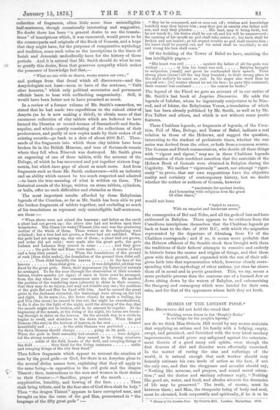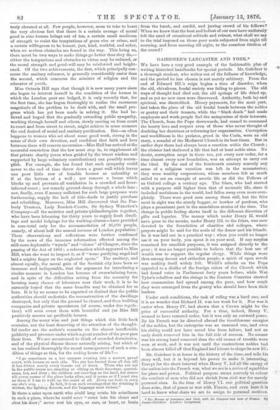HOMES OF THE LONDON POOR.*
MR8. BROWNING did not hold the creed that
"Washing seven times in the 'People's Baths'
Is sovereign for the people's leprosy," nor do we think Miss Octavia Hill would by any means maintain that supplying an artisan and his family with a lodging, empty, swept, and garnished, and furnished with the very latest sanitary improvements, would prove any safeguard against the entertain- ment therein of a good many evil spirits, even though the first demons of dirt and disorder were effectually exorcised. In the matter of curing the sins and sufferings of the world, it is natural enough that each worker should very honestly estimate his own mode of action as the best, if not the only one, and that the clergyman and moralist should cry, "Nothing like sermons, and prayers, and sound moral educa- tion ;" and the doctor and sanitary reformer reply, "Nothing like good air, water, and food, and abodes wherein the decencies of life may be preserved." The truth, of course, must lie between them; and Man, the composite being of body and soul, must be elevated, both corporeally and spiritually, if he is to be • Homes o the London Poor. By Octavio. Hill. London : Macmillan. 1876.
truly elevated at all. Few people, however, seem to take to heart the very obvious fact that there is a certain average of moral good in nine human beings out of ten, a certain small modicum of strength to resist the temptations of gross vice or crime, and a certain willingness to be honest, just, kind, truthful, and sober, when no serious obstacles are found in the way. This being so, there must be two ways to make things go better than they do,— either the temptations and obstacles to virtue may be reduced, or the moral strength and good-will may be reinforced and height- ened. Of the two achievements, the first, which principally con- cerns the sanitary reformer, is generally considerably easier than the second, which concerns the minister of religion and the educator of youth.
Miss Octavia Hill says that though it is now many years since
she began to interest herself in the condition of the homes in which the London poor are lodged, it is only recently that, for the first time, she has begun thoroughly to realise the enormous magnitude of the problem to be dealt with, and the small pro- gress which has yet been made in solving it. She had be- lieved and hoped that the gradually extending public sympathy, working through herself and others, slowly moving on from court to court and from street to street, might achieve in some measure the end desired of social and sanitary purification. But—as often happens to women who set about some good work, strong in the sense of their own devotion, and confident that faith and love between them will remove mountains—Miss Hall has arrived at the mournful conviction that the law must step in, to supplement all that private charity (even when guided by the truest wisdom and supported by large voluntary contributions) can possibly accom- plish. For example, she has found that such sympathy could never to the end of time throw down a great wall which leaves one poor little row of humble houses as unhealthy as if at the bottom of a well; nor remove a house which blocks up and prevents all ventilation in a crowded and fever- infected court ; nor remedy ground-damp through a whole lane ; nor, finally, even if money sufficient for such large purposes were forthcoming, supply the lack of title-deeds to justify purchase and rebuilding. Moreover, Miss Hill discovered that the Pea- body Trustees, Lady Burdett-Coutts, Sir Sydney Waterlovr's Company—all the societies and private philanthropists together, who have been labouring for thirty years to supply fresh dwell-
ings and model lodgings for the working-classes—have provided in sum-total only for the accommodation of 26,000 people, namely, of about half the annual increase of London population!
These observations and reflections were further confirmed by the news of de immense reformation effected among the still more deplorable ,g wynds" and "closes" of Glasgow, since the
passing of the Act of 1866; a reformation which appeared to Miss Hill, when she went to inspect it, as if "some purifying angel had laid a mighty finger on the neglected spots." The sanitary, and almost equally, the moral gain of the Scottish city have been so immense and indisputable, that the argument for introducing a similar measure in London has become of overwhelming force, and in spite of the difficulties arising from the necessity for bousing many classes of labourers near their work, it is to be earnestly hoped that the same -benefits may be obtained for us here. It is by no means to be expected or desired that the public authorities should undertake the reconstruction of the dwellings destroyed, but only that the ground be cleared, and then building companies and private speculators (of course, under due regula- tion) will soon cover them with beautiful and (as Miss Hill positively assures us) profitable houses.
Among the many wise and just things which this little book
contains, not the least deserving of the attention of the thought- ful reader are the author's remarks on the almost insufferable publicity and pressure under which a great number of the poor pass their lives. We are accustomed to think of crowded dormitories, and of the physical disease thence naturally arising, but which of is has realised thoroughly the moral consequences of such a con- dition of things as this, for the waking hours of life?— "I go sometimes on a hot summer evening into a narrow, paved -court, with houses on each bide. The sun has heated them all day, till it has driven nearly every inmate out of doors. Those who are not in the public-house are standing or sitting on their doorsteps, quarrel- some, hot, and dirty ; the children are crawling on the hard, hot stones till every corner of the place looks alive, and it seems as if I must step on them if I am to walk up the court at all. Every one looks in every one elses ?ray In fact, it is on such evenings that the drinking is wildest, the fighting fiercest, and the language most violent."
Is there a saint upon earth who could long retain his saintliness in such a place, where he could never 4' enter into his closet and shut his door ;" never rest his eyes, or ears, or heart, or brain from the harsh, and sordid, and jarring crowd of his fellows? When we know that the best and holiest of our race have uniformly felt the need of occasional solitude and retreat, what shall we say to the trial imposed on those poor souls subjected from night till morning, and from morning till night, to the ceaseless friction of the crowd?



































 Previous page
Previous page